Save the Cranker protest begins at Adelaide’s threatened Crown and Anchor Hotel
Campaigners say the government could easily end the controversy over a developer’s plan to gut the Crown and Anchor Hotel if it wanted to, after thousands rallied to save the iconic venue.
City
Don't miss out on the headlines from City. Followed categories will be added to My News.
Thousands of people gathered at The Crown and Anchor Hotel – affectionately nicknamed the Cranker – on Sunday, before marching to Parliament House to demand the state step in to save the pub from developers.
Patrons and music fans staged the colourful protest into the afternoon in a push to change laws to prevent Singaporean developer Wee Hur Holdings Ltd from realising its designs that would gut the popular live music venue and replace it with a cafe and yoga studio under a 19-storey student accommodation tower, leaving just the building’s facade.
The 171-year-old pub is listed on the local heritage register but those protections only safeguard the building’s historic facade.
All female band Pelvis - a venue regular - kicked the protest off from a flatbed truck in front of the pub, rallying the crowd ahead of the march to Parliament.
Crowds chanted “save the Cranker” and “not just bricks and mortar” as they marched along North Terrace, holding up signs with the words “gutting the inside is not preserving” and “older than the Eiffel tower”.
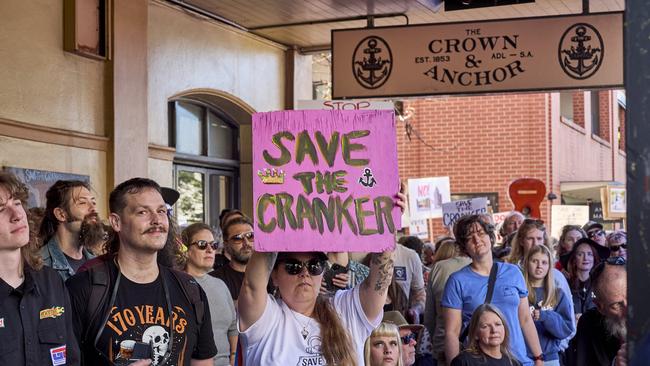
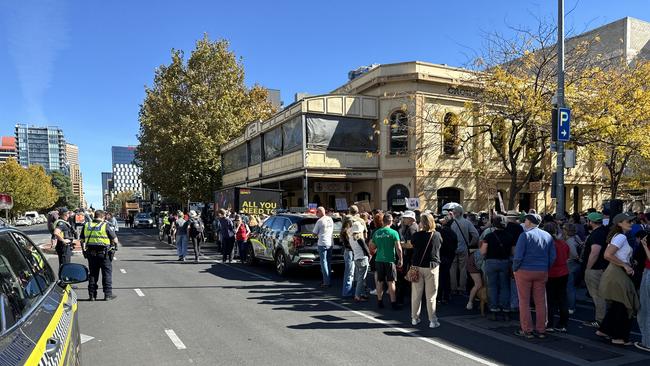



Among those marching was Nicki Gartlan, vocalist for punk rock band Electric Sex Pants, who played their first gig as a group at the pub in 2015 and have continued to perform at the venue.
She said a number of music venues have shut down in recent years, making it all the more important to save the Cranker.
“We’re supposed to be the festival state, we’re known for the arts, we’re known for our music and it’s dying,” she said.
“We need to keep that culture alive, it’s super important for all the generations.”
For Gartlan, the Crown and Anchor is much more than just a venue - it’s a place that holds some of her fondest memories.
Her son Jacob Gartlan, guitarist and singer of Steal Capz, also plays at the hotel.
“To be able to share those lineups with my son have been some of my favorite memories ever, “ she said.
“Maybe one day my grandkids will play there.”

Jacob said being able to play with his family at his favourite venue meant a lot to him.
“It was just special to be able to share,” he said.
“It’s always kind of been the goal to play at the Crown & Anchor
“It’s always an incredible night there. The sound is always great. It’s just the perfect venue.”
SA Heritage Council chair and former Adelaide Lord Mayor Sandy Verschoor bought the venue time when she had the pub provisionally listed on the state’s heritage register but without changes to state planning laws the future of the Cranker remains uncertain.
The Greens have been campaigning for amendments that would see planning and heritage legislation give consideration to the cultural and social value of a place instead of just the build.


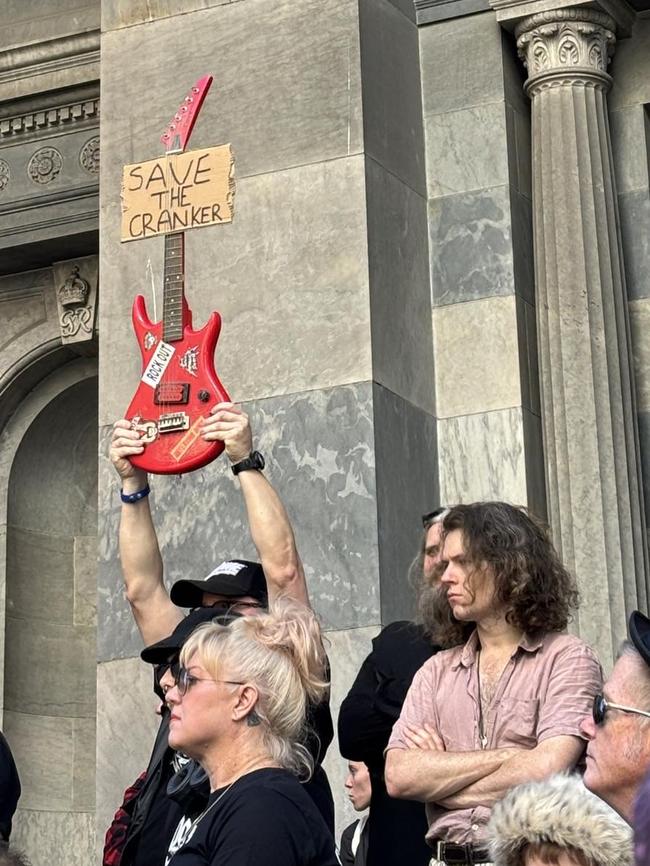
Speaking from the steps of Parliament on Sunday, Greens MLC Robert Simms said his party was taking the fight from the streets into the parliament.
urged support for his motion to oppose plans to redevelop the Crown and Anchor and fix the state’s “broken planning laws”.
“It’s time for Peter Malinauskas to face the music,” he said.
“We need to show the Labor Party that we want a planning system that is about us and that we as citizens have a right to shape the communities that we want to live in.
“We cannot afford to see the wrecking ball fall on yet another one of our iconic pubs.”
The fight to save the iconic pub has united opposing sides of politics, with Shadow Planning Minister Michelle Lensink saying the Liberal Party was working to support Mr Simms’ motion.
Her party has also called on the government to look at ways for the hotel to receive State Heritage Listing.
In a statement, she said the best way forward was for the hotel and student housing to co-exist.
Adelaide Lord Mayor Jane Lomax-Smith said she didn’t blame the developers but the “crook” rules.
Mayor Jane Lomax-Smith said this fight was not just about one pub but the whole city.
“Many people have forgotten that of course we need good development, but the reality is that a city is about livability,” she said.
“It’s about an ecosystem of which you are a part. If we forget that and we think it’s only about development, it will be a sad affair … there will be no street activity, there will be no places that artists and performers can afford to go and it will be impossible for us to live here.
“It’s really important to get the balance right.” Before the march, Save the Cranker campaign spokesman Patrick Maher said the state government had the power to protect the building and its operations if it chose to.“A State Heritage Place listing, while providing stringent physical protection, does not recognise the culture that they nourish, nor allow for these social spaces to live and breathe alongside the society for which they exist,” Mr Maher said.
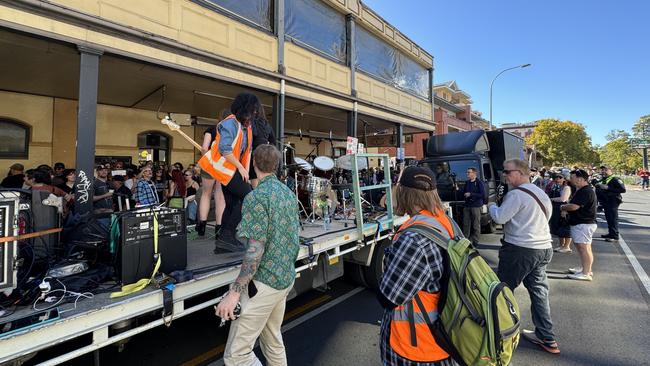
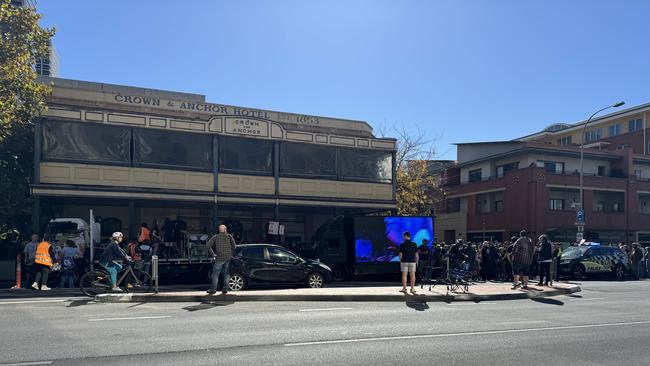
“That very same level of physical protection is actually a threat to the ongoing relevance and success of places such as the Cranker.
“We believe there ought to be a third category, somewhere in the middle, which protects these places from destruction while permitting them to grow as the community does – Premier Malinauskas says he wants Adelaide to grow up, after all.
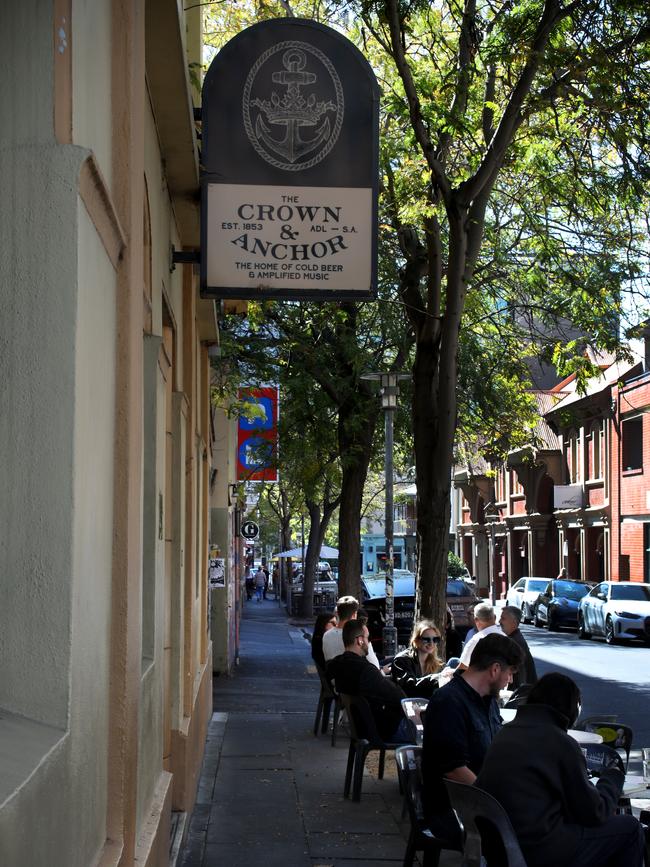
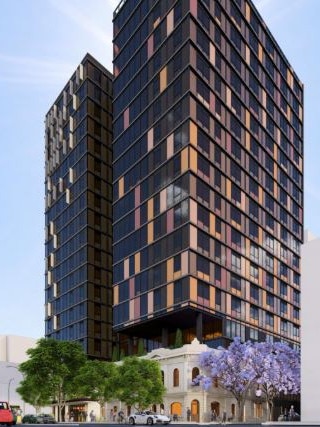
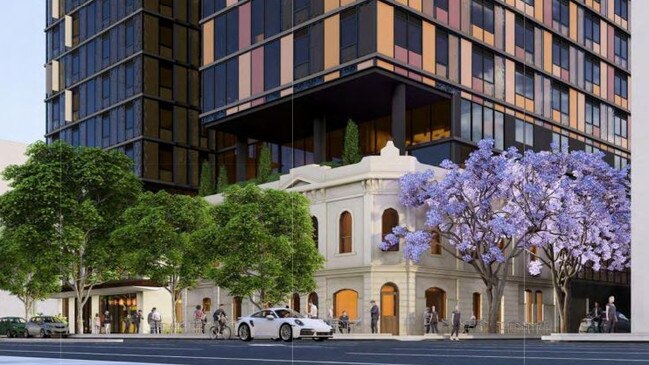
“The simplest solution is a code amendment which the minister could enact today if he wanted to.”
Almost 25 000 people had signed an online petition to “Save the Cranker” from being closed down as a gig venue.
Speakers urged protests to take action, including by writing to their MPs and the State Commission Assessment Panel.
Deputy Lord Mayor Keiran Snape said: “This is a fight the community can win, we just need to keep up the pressure”
SA executive director of Property Council of Australia, Bruce Djite said in a release that the “proposed development above the Crown and Anchor has resulted in a discussion driven by emotion.”
“The government must not entertain the idea of undermining the state’s independent assessment process and more broadly the entire planning system,” Mr Djite said.
“It is not the job of politicians or advocacy bodies to decide what is or isn’t a good development – to do so would set a dangerous precedent and completely undermine a fundamental reason the planning system exists.”
More Coverage
Read related topics:Urban and Regional Development




